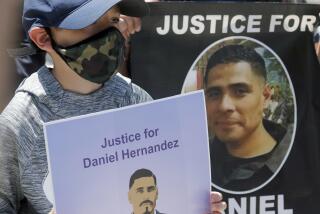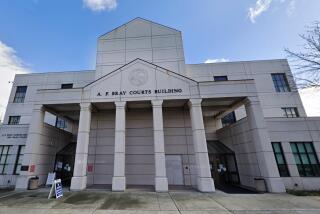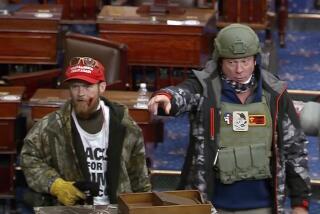Ft. Hood defendant will act as his own lawyer
FT. HOOD, TEXAS — A military judge ruled that Army Maj. Nidal Malik Hasan, accused of killing 13 people and wounding 32 others in a mass shooting, may represent himself at his upcoming court-martial.
The military judge, Col. Tara Abbey Osborn, issued her ruling Monday after an Army physician testified that Hasan, 42, had the stamina to sit and concentrate at trial. Hasan was paralyzed from the chest down after being shot by police during the 2009 attack at Ft. Hood. The physician, Maj. Prasad Lakshminarasimhiah, testified that Hasan suffered no recurring pain or other major complications from his injuries.
Osborn spent most of the hearing urging Hasan not to defend himself, which she said was “unwise” given his lack of legal experience and education. Hasan said he had never defended himself in court, even against a traffic ticket. The judge noted that the lead military lawyer prosecuting him had been practicing law since 1987.
“I’m going to do the best I can do,” Hasan said.
“You would be better off with a trained lawyer who would know the rules of court-martial,” Osborn said, offering Hasan the option of seeking other lawyers. He declined, reiterating the request he first made last month to defend himself.
Hasan appeared lost at times, unable to recall his age and the year he graduated from college. When the judge asked him to list the charges against him, Hasan had to confer with his former attorney before responding.
In granting Hasan’s request, Osborn stipulated that his military team of paralegals and attorneys remain to advise him — one lawyer at the defense table, two in the gallery. She granted Hasan access to the Internet to research his case, access he hasn’t had at the local jail, and provided him office space Monday with a computer and printer in a trailer outside the courtroom. (He is also requesting a telephone and work space at the jail, late at night and on weekends.)
Osborn noted that if Hasan violated courtroom rules — name-calling, for instance, or making statements instead of cross-examining witnesses — she would have his military lawyers take over. She said special provisions would be made for security: Hasan would not have access to classified evidence, weapons in evidence would be locked down, and a bailiff would transfer exhibits from Hasan to witnesses.
Hasan, an American-born Muslim and Army psychiatrist, faces a possible death sentence if convicted. Witnessed have said that Hasan shouted “God is great” in Arabic during the attack at the sprawling military base.
A panel of military medical experts found him competent to stand trial, and he has had military lawyers since he fired his civilian attorney two years ago. On Monday, Hasan appeared in court wearing fatigues and a full salt-and-pepper beard, which he occasionally stroked (he has refused to shave, citing his religious beliefs).
One of the victims subpoenaed to testify said he dreaded being cross-examined by Hasan.
“Not only is he going to try to get a rise out of us, but if he has access to the Internet, that means he can have access to our personal addresses,” said Alonzo Lunsford, 46, of Lillington, N.C., a retired Army staff sergeant shot seven times during the attack.
Lunsford worries Hasan will use his defense to communicate with other radicals, speaking in code.
“This man is playing a game within the confines of our justice system, and we just have to be aware and proactive,” Lunsford said.
In one of his first acts as his own lawyer, Hasan asked the judge to postpone the court-martial for three months so that he could prepare a new witness list and defense. Osborn noted that in his request to represent himself, Hasan had promised not to postpone the trial, which has been repeatedly delayed.
Jury selection is scheduled to start Wednesday, with at least 18 prospective jurors flying in Tuesday. Osborn is expected to consider Hasan’s request at a hearing Tuesday morning.
Hasan described his new defense as a “defense of others.” He will probably argue that he killed American soldiers to protect Muslims overseas, said Jeffrey Addicott, director of the Center for Terrorism Law at St. Mary’s University in San Antonio.
“He has always wanted to use this trial as a platform to advance his belief in radical Islam and to inspire other people to engage in jihad as well,” Addicott said. “He’ll use this to his benefit — his goal is to drag this out as long as possible.”
molly.hennessy-fiske@latimes.com
More to Read
Start your day right
Sign up for Essential California for news, features and recommendations from the L.A. Times and beyond in your inbox six days a week.
You may occasionally receive promotional content from the Los Angeles Times.







